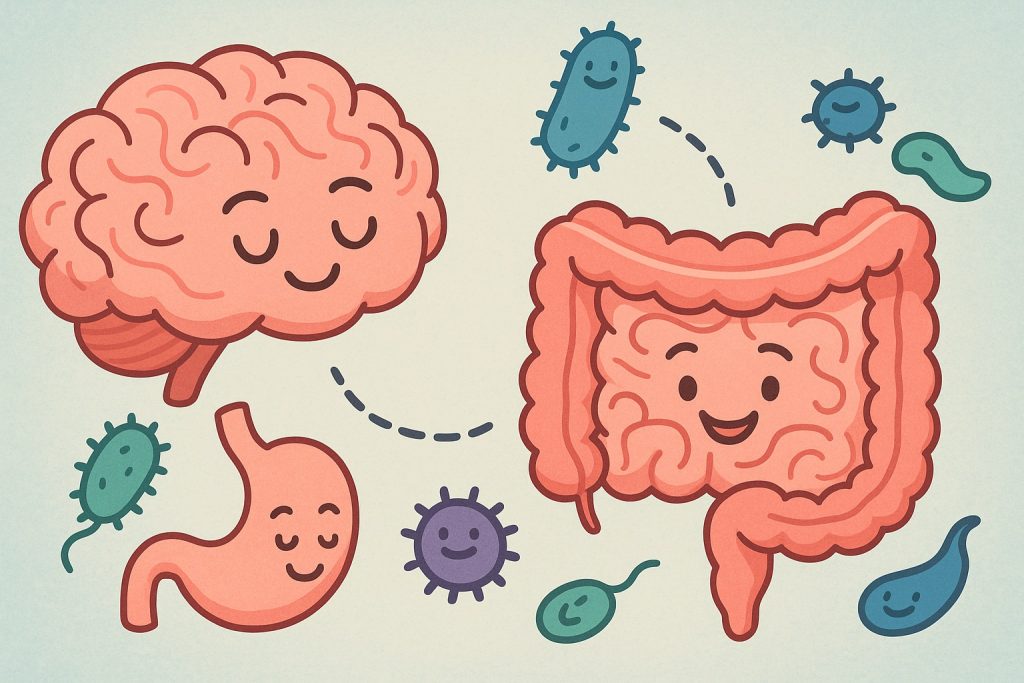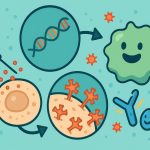In recent years, science has uncovered a remarkable connection between the gut microbiome and the human brain — a communication network often referred to as the gut-brain axis. This discovery is revolutionizing how we understand mental health, offering new insights into the treatment and prevention of conditions such as depression, anxiety, and even neurodevelopmental disorders.
What Is the Gut Microbiome?
The gut microbiome is a complex community of trillions of microorganisms — primarily bacteria — that live in the digestive tract. These microbes play crucial roles in digestion, metabolism, immune response, and the production of vitamins.
But beyond these physical functions, certain gut bacteria also produce neuroactive compounds, such as serotonin, dopamine, and gamma-aminobutyric acid (GABA), which directly influence mood and brain function.
The Gut-Brain Axis: A Two-Way Communication System
The gut-brain axis is the bidirectional communication pathway between the gastrointestinal tract and the brain. This system involves:
- Neural connections, especially the vagus nerve, which links the gut directly to the brain.
- Immune signals, where gut inflammation can affect brain inflammation.
- Hormonal and chemical messengers, including stress hormones and neurotransmitters.
An imbalance in the microbiome, known as dysbiosis, can disrupt this communication and contribute to mental health problems.
Microbiome and Mental Health: What the Research Shows
Growing evidence supports a link between gut health and psychological well-being:
- Depression and anxiety: Studies show that people with these disorders often have less microbial diversity and elevated levels of harmful bacteria.
- Autism spectrum disorders: Children with autism frequently exhibit gut issues and different microbial profiles compared to neurotypical children.
- Stress responses: A balanced gut microbiome may help regulate cortisol, the primary stress hormone.
Animal studies have demonstrated that transferring gut bacteria from anxious or depressed individuals to healthy animals can induce similar behaviors, emphasizing the microbiome’s role in mental state.
How to Support a Healthy Gut for Better Mental Health
- Eat more prebiotics and probiotics
- Prebiotics: fiber-rich foods like garlic, onions, bananas, and whole grains
- Probiotics: fermented foods such as yogurt, kefir, sauerkraut, and kimchi
- Reduce intake of processed foods and sugars
- These can feed harmful bacteria and trigger inflammation.
- Manage stress
- Chronic stress can alter gut flora and impair gut-barrier integrity.
- Consider targeted supplements
- Some strains of psychobiotics (probiotics with mental health benefits) have shown promise in clinical trials.
The Future of Microbiome-Based Psychiatry
The gut-brain connection opens exciting possibilities for personalized mental health care. Future treatments might include microbiome analysis and tailored probiotic therapies to support psychological resilience, reduce medication side effects, or even prevent mental illness onset.
Conclusion
The human gut is more than a digestive organ — it’s an essential part of the brain’s ecosystem. Understanding and supporting the gut microbiome offers a new frontier in mental health, bridging biology, nutrition, and neuroscience in powerful ways. As research advances, the phrase “listen to your gut” may prove to be more scientific than we ever imagined.
Glossary
- Gut microbiome – the collection of microbes living in the human digestive tract.
- Gut-brain axis – the two-way communication system between the gut and the brain.
- Neurotransmitters – chemical messengers that carry signals in the brain and nervous system.
- Dysbiosis – an imbalance in gut microbiota, often linked to health problems.
- Psychobiotics – specific probiotics that may have mental health benefits.


